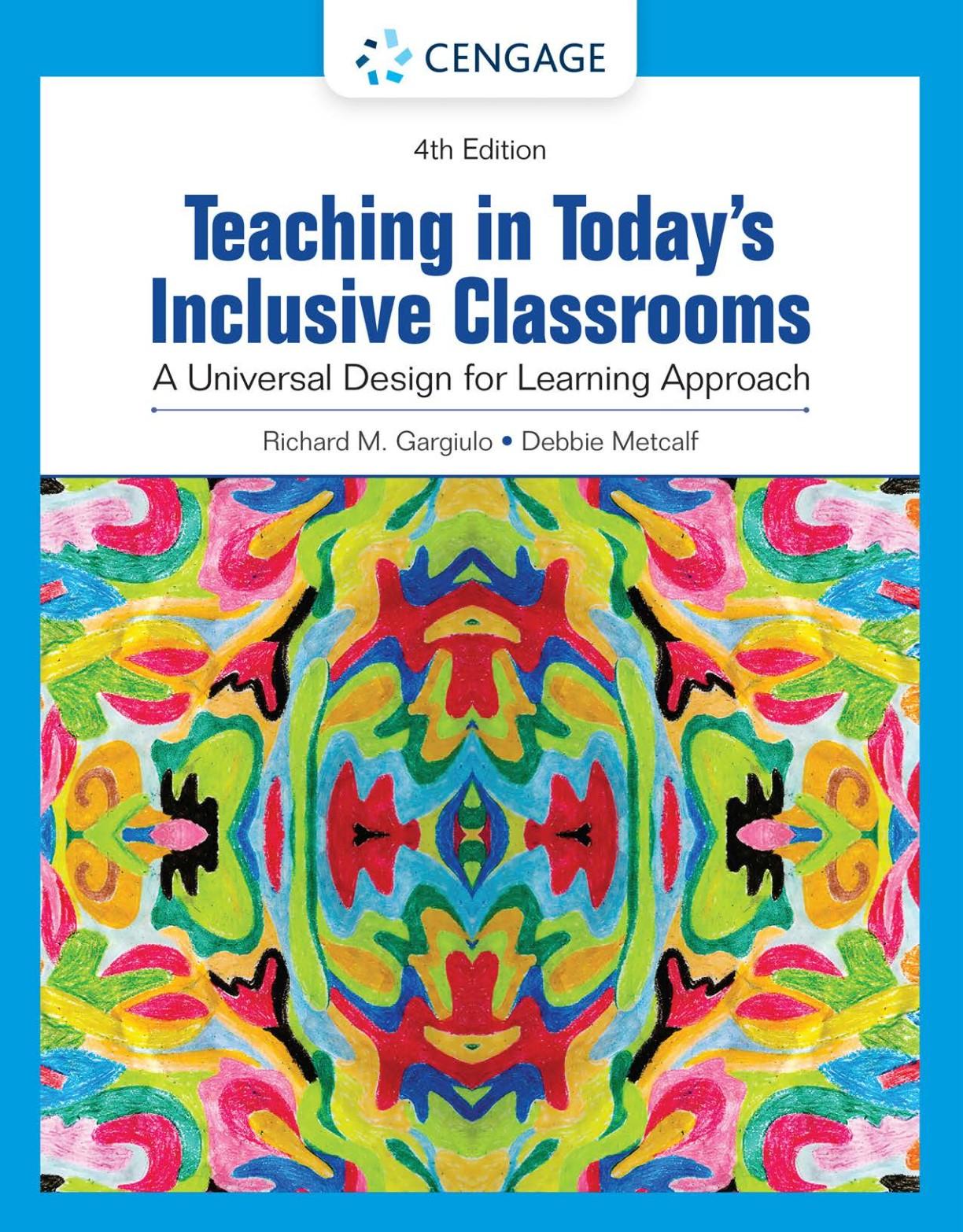
Get complete eBook Instant Download Link below https://scholarfriends.com/singlePaper/456359/ebookteaching-in-todays-inclusive-classrooms-a-universaldesign-for-learning-approach-4th-edition
"Teaching in Today's Inclusive Classrooms: A Universal Design for Learning Approach," 4th Edition by Richard M. Gargiulo and Debbie Metcalf, offers educators a comprehensive framework for effective instruction, classroom management, assessment, and collaboration in diverse educational settings. This edition emphasizes the Universal Design for Learning (UDL) philosophy, focusing on strategies and tools to accommodate the varied needs of all students. Below is a chapter-wise summary:
Part I: Foundations for Educating All Learners
1. Teaching in Today's Inclusive Classrooms: Your Journey Begins
o Introduces the concept of inclusive education and the importance of UDL in modern classrooms.
o Discusses the diverse needs of learners and the role of educators in fostering an inclusive environment.
2. Introducing Universal Design for Learning
o Explores the principles of UDL, emphasizing the need for flexible curricula that accommodate all learners.
o Provides strategies for implementing UDL in lesson planning and instructional delivery.
3. Policies, Practices, and Processes for Special Education and Inclusive Education
o Examines the legal and ethical foundations of special and inclusive education.
o Reviews key legislation and policies that have shaped inclusive practices.
4. Cultural and Linguistic Diversity and Exceptionality
o Addresses the intersection of cultural and linguistic diversity with special education.
o Offers strategies for creating culturally responsive and inclusive classrooms.
Part II: Meeting the Needs of All Learners
5. Students with Learning Disabilities
o Provides an overview of learning disabilities and their impact on student performance.
o Suggests instructional strategies tailored to support students with learning disabilities.
6. Students with Attention Deficit Hyperactivity Disorder
o Discusses characteristics of ADHD and its effects on learning and behavior.
o Recommends classroom management techniques and instructional adaptations for students with ADHD.
7. Students with Emotional and Behavioral Disorders
o Explores the challenges faced by students with emotional and behavioral disorders.
o Offers intervention strategies to promote positive behaviors and academic success.
8. Students with Intellectual and Developmental Disabilities
o Examines the characteristics and educational needs of students with intellectual and developmental disabilities.
o Provides approaches for fostering independence and academic growth.
9. Students with Autism Spectrum Disorder
o Highlights the diverse presentations of autism and their implications for learning.
o Suggests evidence-based practices to support students on the autism spectrum.
10. Students with Communication Disorders
o Addresses speech and language disorders and their impact on education.
o Recommends strategies to enhance communication skills and classroom participation.
11. Students with Hearing and Visual Impairments
o Discusses the educational implications of hearing and visual impairments.
o Offers accommodations and instructional techniques to support these students.
12. Students with Physical Disabilities and Health Impairments
o Explores the challenges faced by students with physical disabilities and health issues.
o Provides guidance on creating accessible learning environments.
13. Gifted and Talented Students
o Examines the characteristics of gifted and talented students.
o Suggests strategies for differentiation and enrichment to meet their advanced learning needs.
Part III: Effective Instruction in Inclusive Classrooms
14. Differentiating Instruction
o Focuses on tailoring instruction to meet the diverse needs of all students.
o Introduces various models and strategies for effective differentiation.
15. Classroom Management in Inclusive Classrooms
o Provides techniques for establishing and maintaining a positive classroom environment.
o Emphasizes proactive management strategies and the development of social-emotional skills.
16. Assessing Student Progress in Inclusive Classrooms
o Covers various assessment tools and practices that accommodate diverse learners.
o Discusses formative and summative assessments, as well as alternative assessment methods.
17. Collaborating with Families and Professionals
o Highlights the importance of collaboration between educators, families, and other professionals.
o Offers strategies for effective communication and partnership building.
This edition is enriched with case studies, research-based teaching strategies, and extensive coverage of standards, making it a valuable resource for both pre-service and in-service teachers aiming to create inclusive and effective learning environments.
Get complete eBook Instant Download Link below
https://scholarfriends.com/singlePaper/456359/ebookteaching-in-todays-inclusive-classrooms-a-universaldesign-for-learning-approach-4th-edition
